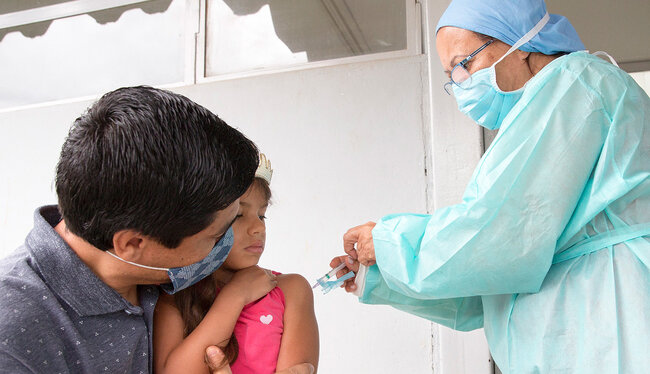
Washington, D.C., August 14, 2020 (PAHO) — While Countries of the Americas have implemented innovative strategies to boost immunization programs during the COVID-19 pandemic, concerns about risk of exposure, as well as challenges accessing services during lockdown, have led to a reduction in vaccination coverage, a series of internal surveys from the Pan American Health Organization (PAHO) show.
The surveys were conducted with PAHO immunization program consultants in 16 countries in Latin America, and 22 countries in the Caribbean, and show that as lockdown policies have declined and relaxed, the provision of regular vaccination services has increased.
This is due to the implementation of measures including drive-through vaccination, mobile vaccination centers, vaccination in homes and other strategic locations such as banks and empty schools, as well as digital communication to emphasize the importance of immunization during a pandemic.
Despite these efforts, however, the Summary of the Status of National Immunization Programs during the COVID-19 Pandemic reveals that public concern around the risk of exposure to COVID-19 has affected demand for vaccination services. Other issues, such as lockdown or physical distancing, as well as limitations in public transport have also led to a reduction in vaccination coverage and an increase in existing gaps.
Reports from 23 countries reveal a decrease of between 12% and 14% in the number of doses of diphtheria, tetanus and pertussis vaccine (DTP) and measles, mumps and rubella (MMR) vaccine administered to children when compared to the same period last year, particularly in March.
Dr. Cuauhtemoc Ruiz Matus, Head of PAHO’s Immunization program, emphasized the need for “countries to continue to implement innovative measures and strategies to reach those who have not been vaccinated.” He also called for more initiatives in social communication “to transmit messages to the population regarding the importance of immunization in keeping people healthy and protected from vaccine-preventable diseases.”
In the survey, participants from 17 countries reported an impact on epidemiological surveillance due to a shift in priorities towards SARSCoV-2 cases. However, other factors such as human resources dedicated to respond to the pandemic, reduced field investigations and screenings for vaccine-preventable diseases, as well as a halt in the shipment of samples for analysis, have also impacted surveillance. Survey participants also indicate that case reporting has decreased significantly.
The closure of international borders and problems with international transport has also led to difficulties in the delivery of vaccines and supplies for national immunization programs, with surveys from 18 countries (47%) reporting issues in this area.
Of those that responded from 38 countries, 12 also emphasized disruption to laboratory services due to the reprioritization of work towards diagnosing COVID-19 cases.
The publication analyzed the results of surveys carried out every two weeks from April until 6 July 2020. The surveys show that routine vaccination services have slowly increased in the last months. All respondents reported in the most recent survey that vaccination services were open.
Contacts
Leticia Linn
Sebastian Oliel
Ashley Baldwin
mediateam@paho.org

